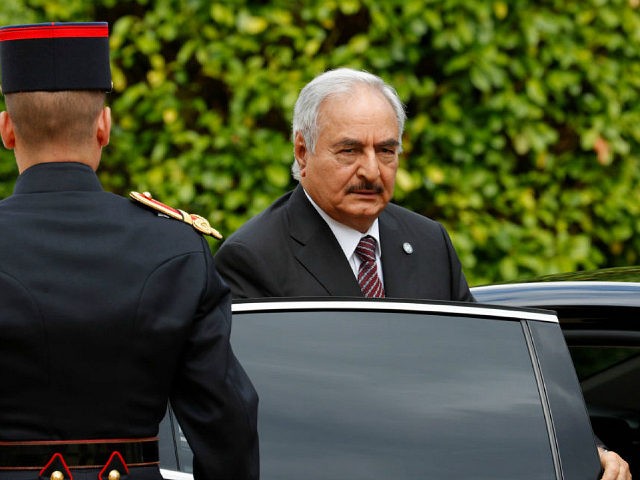The potential absence of former Gen. Khalifa Haftar, a military strongman who leads the prominent Libyan National Army (LNA), could create a power vacuum and fuel the chaotic conditions that have allowed jihadist groups to remain active in the North African country, according to several experts.
Libya descended into chaos in 2011 after a U.S/NATO-backed uprising overthrew dictator Muammar Qaddafi, leaving armed groups, political factions, and jihadist organizations vying for control.
Gen. Haftar is considered a stabilizing force and a deterrent against the various terrorist groups in Libya, namely al-Qaeda and the Islamic State (ISIS/ISIL).
Despite suffering significant losses, ISIS and al-Qaeda remain a “potent” threat in the North African nation, some experts told the House Foreign Affairs Subcommittee on the Middle East and Africa on Wednesday.
CNBC reports:
Libya’s most powerful military leader reportedly suffered a stroke this week — and no one can confirm whether he is dead or alive.
Local media has reported General Khalifa Haftar’s death, while sources close to him insist he is recovering. If the former is true, it could mean a renewal of violence and a power struggle that could hit the OPEC country’s oil output and create new opportunities for extremist groups like the Islamic State militant group.
Conflicting reports have surfaced surrounding the death of the commander of eastern Libya’s LNA coalition of military units, militia groups, and local fighters that reject the United Nations-backed Government of National Accord (GNA), based in the western part of the North African country.
While the United States backs the GNA, Haftar’s Libya opposition administration reportedly enjoys support from Egypt, Russia, and the United Arab Emirates (UAE).
The LNA and the United Nations mission in Libya have dismissed claims about Haftar’s death, alleging that he is “in stable condition” in Paris. Nevertheless, the reports about his health have already triggered uncertainty and confusion as rumors and questions about the future of Libya without Gen. Haftar swirl around.
William Lawrence, a Libya expert and professor at George Washington University, indicated to France 24 that Haftar’s absence presents “an opportunity for jihadists to gain ground.”
While testifying before a House panel on Wednesday, experts suggested it is nearly impossible to verify the 75-year-old strongman’s health conditions.
The U.N.-brokered Libya Political Agreement aimed at forging a unified Libyan government is contingent upon “what happens in the east without Haftar,” Alice Friend from the Center for Strategic and International Studies (CSIS) told the House panel on Wednesday.
“As of this writing, Haftar’s condition is still unclear, although sporadic reports of his death in a Paris hospital over the weekend of April 14th and 15th appear to be have been incorrect,” she noted.
Christopher Blanchard, a specialist in Middle Eastern affairs at the Congressional Research Service (CRS), conceded that the conflicting reports about Haftar’s death have generated “confusion,” telling lawmakers:
In April 2018, press reports concerning Haftar’s alleged incapacitation or death—reportedly due to a stroke—caused confusion and uncertainty. Analysts and observers are emphasizing the LNA coalition’s potentially fractious internal makeup, speculating about its durability, and discussing the potential related implications for Libya’s stability.
Although Haftar’s LNA is known to stand against jihadist groups in Libya, the CRS linked the faction’s fighters to human rights abuses at some of the detention facilities they operate, citing a United Nations report issued last week.
The U.N. noted:
Men, women and children across Libya are arbitrarily detained or unlawfully deprived of their liberty based on their tribal or family links and perceived political affiliations. Victims have little or no recourse to judicial remedy or reparations, while members of armed groups enjoy total impunity.
Still, rumors had been circulating of Haftar running for president of Libya.
“Haftar became a major military and political power center in his own right, with rumored designs on control of national governance,” noted the CSIS expert.

COMMENTS
Please let us know if you're having issues with commenting.